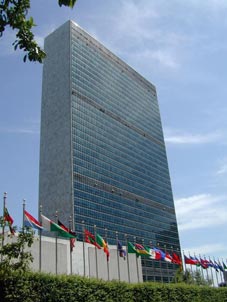More Support for Georgia at UN General Assembly
By Etuna Tsotniashvili
Thursday, September 9

The Russian Federation made serious destructive efforts to politicise the distinctly humanitarian and balanced approach of the Resolution and to block the consideration of the document itself. However, the Resolution was passed by a wider margin than in previous years (with 50 countries voting in favor, 17 - against and 86 abstentions. Last year’s (2009) vote was: 48 in favor, 19 – against with 78 abstentions).
”Compared to previous year's vote, Georgia received 2 more voices and accordingly, Russian diplomacy has lost two voices,” Georgia’s Foreign Minister Grigol Vashadze stated at a briefing yesterday. “This tendency will last for the simple reason - the international society makes verdict for Russia’s occupation regimes actions on the occupied Georgian territories,” Vashadze added.
Commenting on the resolution President of Georgia Mikheil Saakashvili compared its adoption to a “struggle between good and evil”, stating that Russia is on the side of evil which attempted to bribe some countries and blackmailed several of them.
“Russia is against the resolution, which says that people should return to their houses, where they were born… Russia is on the side of evil… The good has won a small, but important victory,” the President said emphasising that Georgia will still continue the struggle until the eventual victory which will be when the occupying force leaves our territory.
“Our diplomacy has achieved great success not because of the fact that the number of supporters of Georgia has grown and the number of Russia’s allies has shrunk, but because of the great blow to Russian policy - Iran, Algeria, Bolivia, Ecuador and many other countries were not among the supporters of Russia in this discussion,” Temur Iakobashvili, Minister for Reintegration said.
The Resolution stresses that the right of safe and dignified return of all internally displaced persons and refugees and their descendants, regardless of ethnicity, to their homes in Abkhazia and Tskhinvali region is unchallenged and reiterates the need to respect the property rights of everyone displaced. The resolution expresses concern regarding the violent change in the demographic picture as a result of the conflicts on Georgian territory and says that the UN General Assembly supports the unacceptability of change in the demographic situation in Georgia’s breakaway regions.
The document also emphasizes the necessity for the protection of the property rights of these people in their native regions. The assembly resolution calls upon people who want to buy real estate in Abkhazia to abstain from violating the property rights of the IDPs and refugees. It underlines the urgent need for unimpeded access for humanitarian activities to all internally displaced persons, refugees and other persons residing in every conflict-affected area throughout Georgia;
Regarding the Geneva talks which have been held since September 2008 following the Russian-Georgian war, the resolution calls upon all participants in the Geneva discussions to intensify their efforts to establish a durable peace, to commit to enhanced confidence-building measures and to take immediate steps to ensure respect for human rights and create favourable security conditions conducive to the voluntary, safe, dignified and unhindered return of all internally displaced persons and refugees to their places of origin.
Russian Prime Minister, Vladimir Putin believes that the UN International Court must acknowledge Abkhazia and South Ossetia as independent, the Russian press reports.
“Putin said, the International Court acknowledged Kosovo’s independence despite Serbia’s resistance and it’s time to do the same in the cases of Abkhazia and South Ossetia.,” German political scientist, Alexander Rahr reported in Rossiskaia Gazeta. (The UN International Court acknowledged Kosovo’s independence in 2010).
According to Apsny Press, at yesterday’s briefing Sergey Bagapsh, de facto president of Abkhazia stated that the UNGA resolution does not have any importance for them, adding that during the preparation of the resolution there were no consultations with the Abkhazian side.
“If Georgia and those countries want to solve this problem without our participation that’s their problem. Let them decide what they want, we have nothing in common with this resolution,” Bagapsh said.
Similar resolutions have previously been passed by the General Assembly over the last two years. Georgia however tries to increase the number of UN member states that vote in favour of the resolution.
According to 2009 data, about six percent of the population of Georgia – some 251,000 people – was displaced following the conflicts in Abkhazia (1992-1993) and Tskhinvali region (1989-1992).
Another 128,000 people fled South Ossetia and the Kodori Gorge of Georgia’s other breakaway region, Abkhazia during and after the August 2008 war. The majority have since returned to their homes, but almost 26,000 people are still unable to return.
